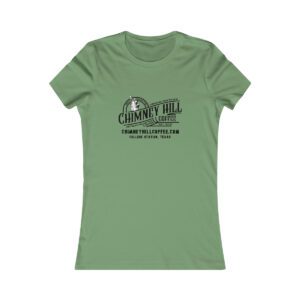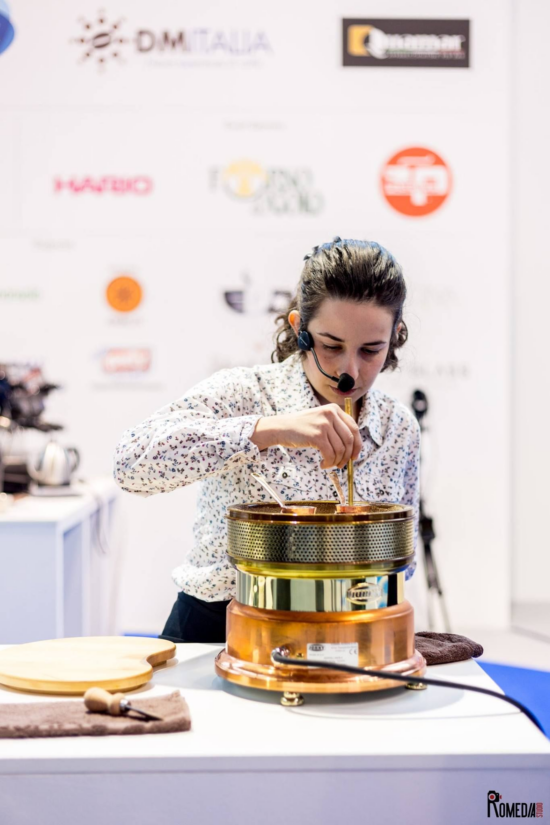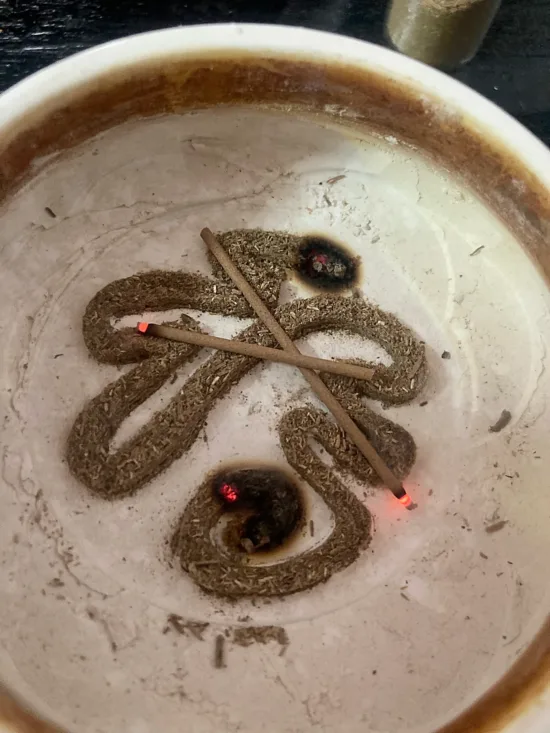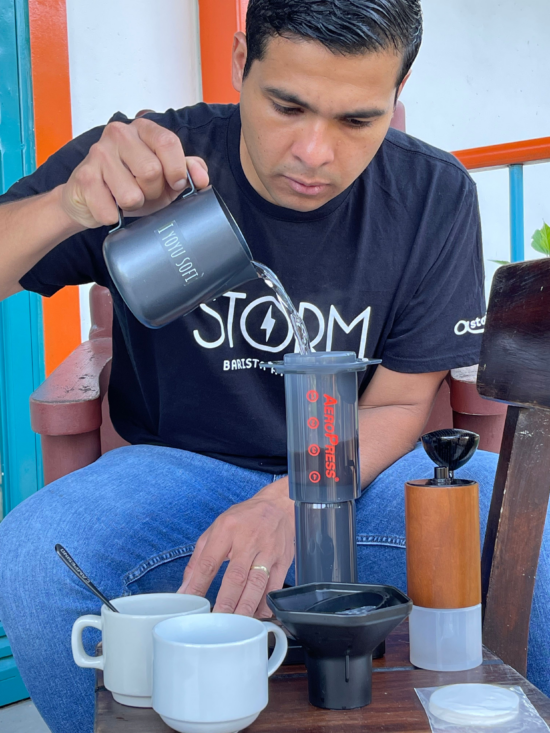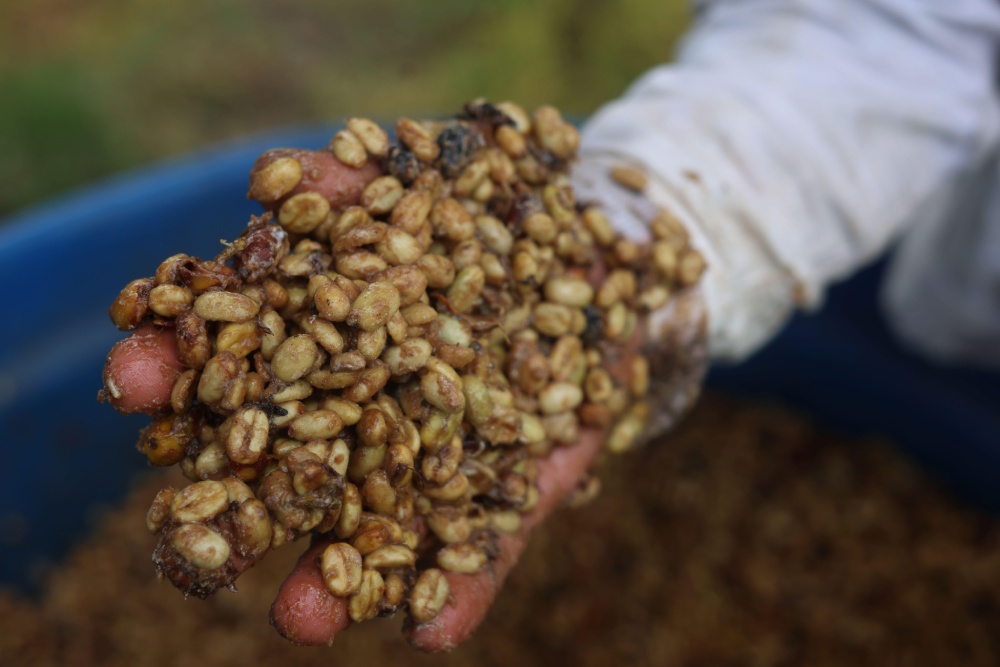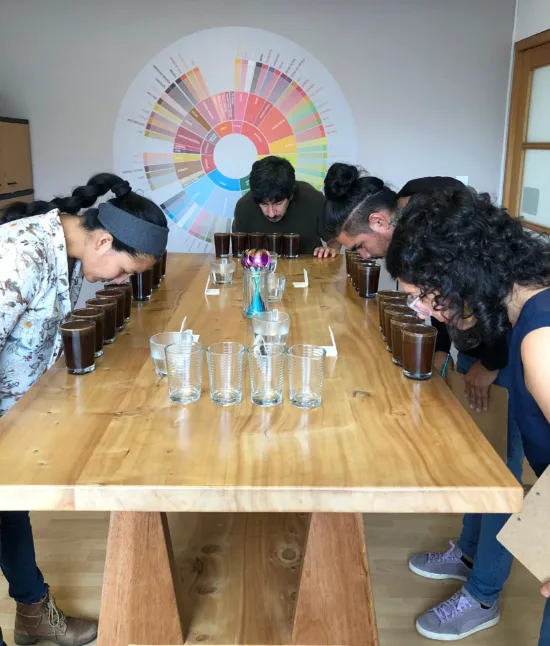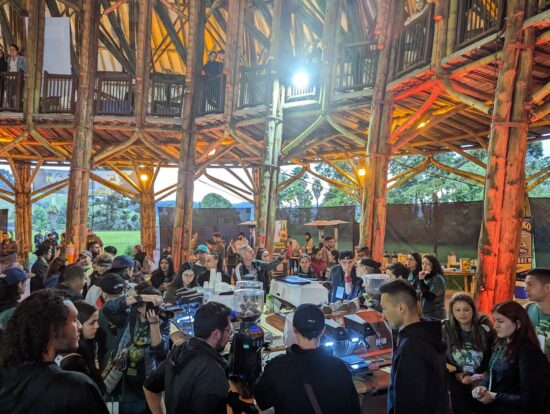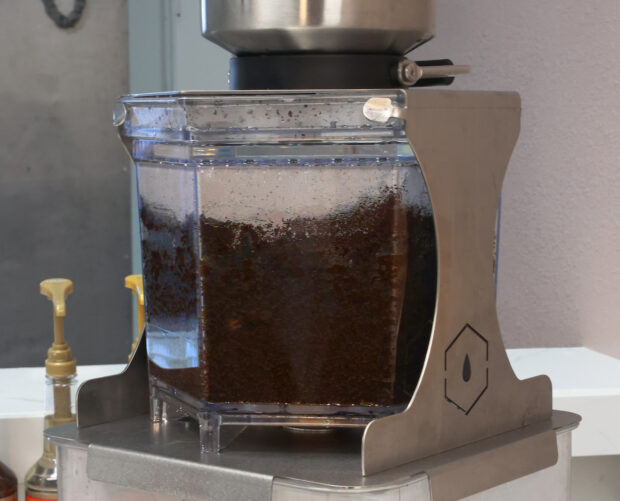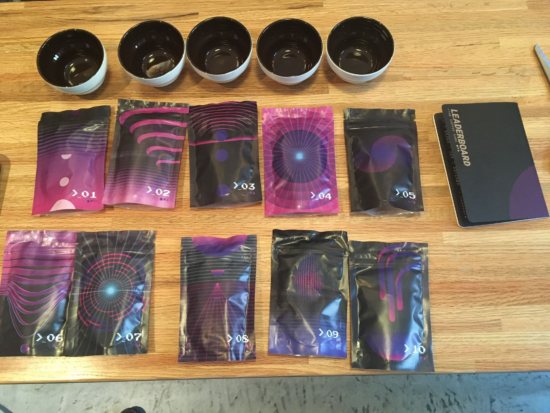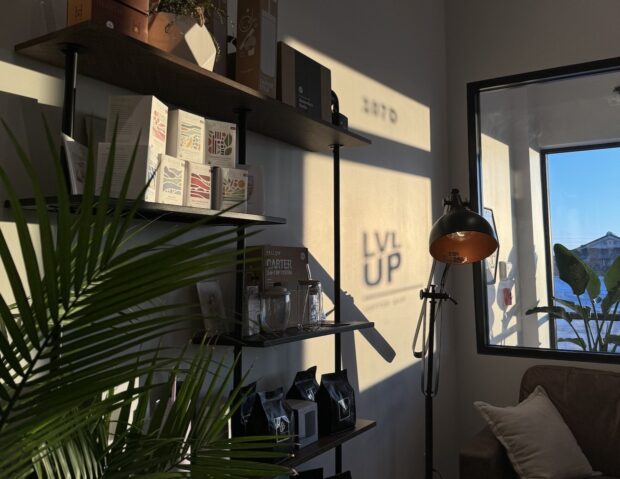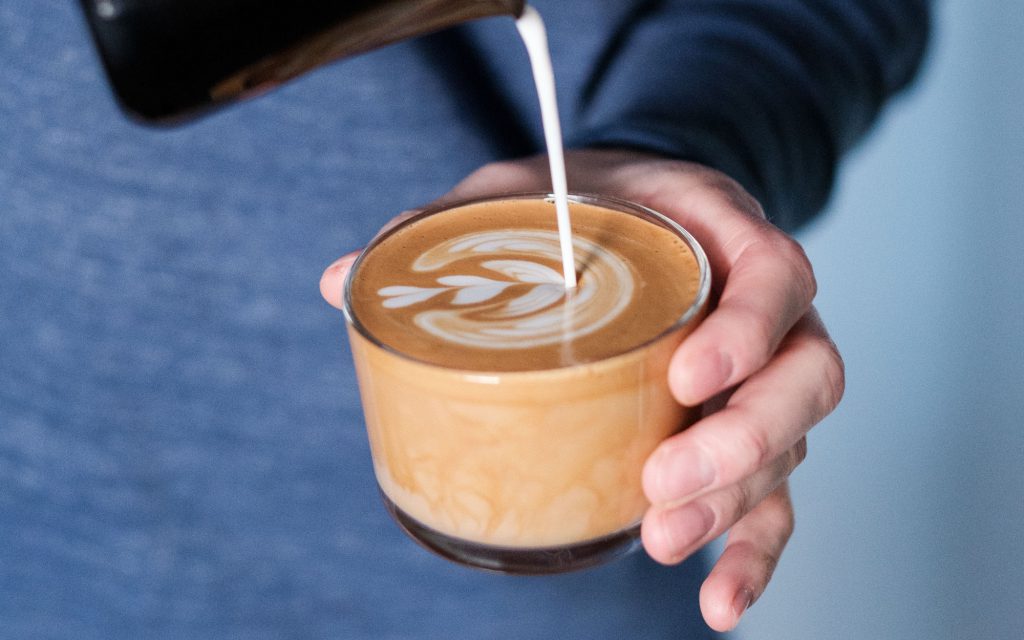This is the absolute fastest way to make French press iced coffee. Just forget about cold brew concentrate – with this Quick French Press Iced Coffee Recipe you can have your iced coffee ready in 5 – 6 minutes. Who doesn’t like the French press?! It’s...
When Activism and Arabica Come Together: The Black Baza Coffee Company
When Activism and Arabica Come Together: The Black Baza Coffee Company
When Activism and Arabica Come Together: The Black Baza Coffee Company
When Activism and Arabica Come Together: The Black Baza Coffee Company
When Activism and Arabica Come Together: The Black Baza Coffee Company
When Activism and Arabica Come Together: The Black Baza Coffee Company
I Tested Keurig K Compact – Here’s Everything You Need To Know
The most affordable Keurig coffee maker is available exclusively at Walmart and comes at a sweet price of only $59.00. In this article, you’ll find out how good it really is, and also find additional information like how to clean it, or do you need a water...
Here’s How to Change Keurig 2.0 Water Filter Easily
Not sure how to change Keurig 2.0 water filter? Here are step-by-step instructions that will help you do it quickly and easily. Keurig water filter should be changed every 2 months or 60 tank refills. The water filter is located inside the water tank, on the valve at...
The coffee rose for assessing Anaerobic coffee
I just came across this really neat tool to assess anaerobic coffees. I haven't used it for cupping yet. I'm not sure I will like it either because the idea of lowering the score of the coffee just because it tastes has some thyme flavors. At the same time I...
Three US Coffee Championship Events Are Heading To Rancho Cucamonga
This article is from the coffee website Sprudge at http://sprudge.com. This is the RSS feed version. The 2024 US Barista Championship, Brewers Cup, and Cup Tasters will take place March 15-17 at Klatch Coffee Roasters in Rancho Cucamonga, California.
The Origin Story of Turtle Island Coffee in Vancouver, B.C.
A new Indigenous-owned coffee company based in Vancouver, British Columbia, called Turtle Island Coffee has launched with the goal of exposing more people to high quality specialty coffee and Indigenous...
Get Ready for The Barista League’s 2024 Season
The Barista League has announced 12 competitions across four continents. BY J. MARIE CARLANBARISTA MAGAZINE ONLINE Photos courtesy of The Barista League When The Barista…
Get Ready for The Barista League’s 2024 Season
The Barista League has announced 12 competitions across four continents. BY J. MARIE CARLANBARISTA MAGAZINE ONLINE Photos courtesy of The Barista League When The Barista…
Get Ready for The Barista League’s 2024 Season
The Barista League has announced 12 competitions across four continents. BY J. MARIE CARLANBARISTA MAGAZINE ONLINE Photos courtesy of The Barista League When The Barista League announces new events, it’s worth paying attention! This year, the schedule will be...
Weekly Coffee News: EUDR and Africa + More Celebrity Coffee
Welcome to DCN’s Weekly Coffee News. Keep up with all the latest coffee industry stories and career opportunities by subscribing to DCN’s newsletter. Tell our editors about your news here. Report: Small-Scale Farmers in...
Do Higher Coffee Prices Mean More Money For Farmers? A Story From Sumatra Shows It’s Complicated
This article is from the coffee website Sprudge at http://sprudge.com. This is the RSS feed version. Since coffee costs more now than ever, do those coffee prices impact the amount of money earned by coffee farmers?
Coffee News Recap, 2 Feb: Applications open for Australia’s Richest Barista 2024, De’Longhi reports 4.6% revenue increase after La Marzocco move & other stories
Every Friday, Perfect Daily Grind rounds up the top coffee industry news from the previous week. Here are this week’s coffee news stories. The word of the week is: expansion. Mon, 29 Jan AeroPress launches limited-edition Clear Pink brewer. The coffee brewer is made...
Watch The 8 Best Coffee Videos Vying For Sprudgie Awards
This article is from the coffee website Sprudge at http://sprudge.com. This is the RSS feed version. The best coffee videos from 2023 featuring Cafe Imports, Aramse, Nguyen Coffee Supply, Wildly, Mirror Coffee Roasters, Alto Stories, Quek Shio, and Cafe Retiro.
Robusta is great and has untapped potential
I live in the US and my typical choice of coffee is lightly roasted Ethiopian pour overs. I generally love acidity and fruit flavors in my coffee. My experience with Robusta has often been poor. Very dark, roasty and maybe chocolatey. I participated in the Hoffman...
Design Details: Brewing Reinvented at ULA Café in Melbourne
Welcome to Design Details, an ongoing editorial feature in Daily Coffee News focused on individual examples of coffee shop architecture, interior design, packaging design or branding. If you are a coffee...
Robert Downey Jr.’s New “Happy Coffee” Is Really Depressing
This article is from the coffee website Sprudge at http://sprudge.com. This is the RSS feed version. Robert Downey Jr. and Craig Dubitsky team up for Happy Coffee.
Out Now: The February + March 2024 Issue of Barista Magazine!
In our new issue we feature Lisa Lawson from Glasgow, Scotland, take a look at the newest grinders, explore spring drink inspiration, see how more women are getting involved in coffee tech, and much more! BY SARAH ALLENBARISTA MAGAZINE We’re stoked to announce the...
The coffee industry’s biggest competition: The story of the World Barista Championship
Every year, the global coffee industry gears up for one of its most exciting and groundbreaking competitions: the World Barista Championship. For more than two decades, the WBC has been one of the biggest catalysts for change and innovation in specialty coffee, and...
The 2023 Specialty Coffee Transaction Guide Has Landed
The 2023 edition of the Specialty Coffee Transaction Guide (SCTG) guide went live today, providing actors throughout the coffee chain a data-driven tool for green coffee price discovery. The full...
Espro great until I needed replacement filter ☹️
I've had an Espro P7 for nearly four years after seeing glowing praise on this sub (to which I later contributed). Before I bought the P7 I looked at the replacement parts available and they seemed like a solid company in that they sold e.g. replacement filters...
New Bill Requires More Kona In Your Kona Coffee
This article is from the coffee website Sprudge at http://sprudge.com. This is the RSS feed version. Currently a coffee only need to be 10% Kona to be labeled as such.
What’s the best and worst part about owning and running a coffee shop?
I'm not interested in getting into it myself, as I have no experience in the service industry, no real appetite for risk and no desire to run a business in general. But sometimes I think about it and I wonder what's the most enjoyable thing about it and...
minimum dose size?
I use the Hario switch to brew my coffee and am trying to reduce my caffeine consumption. Hence I would like to brew smaller cups of coffee. I am currently using 10g of coffee with 160g of water. (1:16 Ratio) I am wondering if there is a minimum amount of coffee...
[CAFE OWNERS] Background before starting a shop?
I’ve worked in coffee for 6 yrs as a barista and shift supervisor and have passion for it. I’ve decided that I want to open my own place in the future and so I’ve been doing the research to make a business plan. Lately, however, I’ve begun to realize just how many...
When Activism and Arabica Come Together: The Black Baza Coffee Company
In part two of our series on coffee packaging in India, we meet a roaster whose bags represent some of India’s iconic animals.
BY RESHIL CHARLES
SPECIAL TO BARISTA MAGAZINE
Photos courtesy of Black Baza Coffee Company
Editor’s note: This is the second part in our coffee packaging series; head here to check out part one.
Despite all the positive aspects of growing coffee, Arshiya Bose has taken note of two major drawbacks: deforestation of biodiverse areas and unfair market prices for smallholder producers. So she started the Black Baza Coffee Company in 2017 in Bengaluru, India, with the aim of working mainly with smallholder producers and farmers in tribal areas and conserving the ecosystem around the coffee farms she sources from.
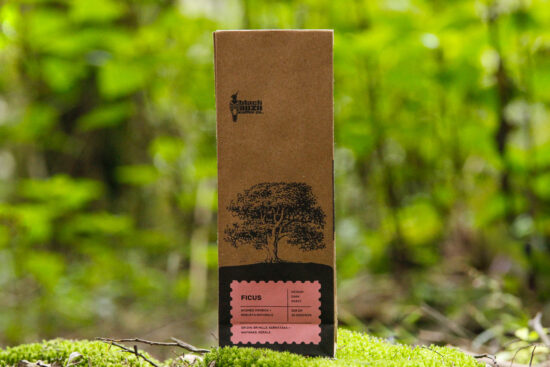

Black Baza Coffee Company’s Ethos
Arshiya’s activism is visible on each bag of Black Baza beans, aptly named after the black baza bird of prey found across South Asia. “Each species or living organism that we highlight on our packs is a part of the region that that particular coffee comes from. Just the fact that these species are present around the farms we work with is an indication of a pesticide-free environment,” explains Arshiya. “We are trying to bring attention to the fact that an entire ecosystem of plants, animals, and environment interconnects to produce the cup of coffee that the drinker finally sips.”
Earth-Friendly by Design
Each package of Black Baza coffee is made of paper from sugarcane waste, with biodegradable plastic on the inside. Each roast is named after a specific species; the Galaxy Frog medium roast, for example, features a sketch of a frog endemic to the Kerala region. The Whistling Schoolboy blend of arabica, robusta, and chicory is named after the Malabar whistling thrush, a bird found in the Western Ghat region of India.
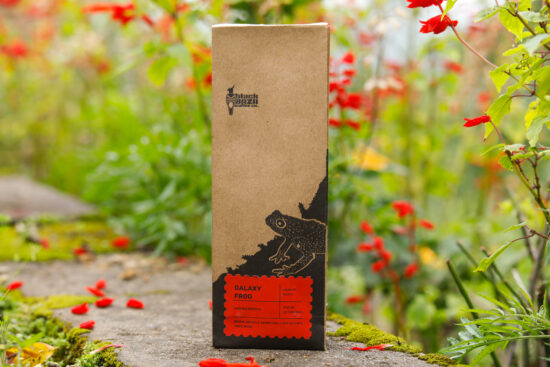

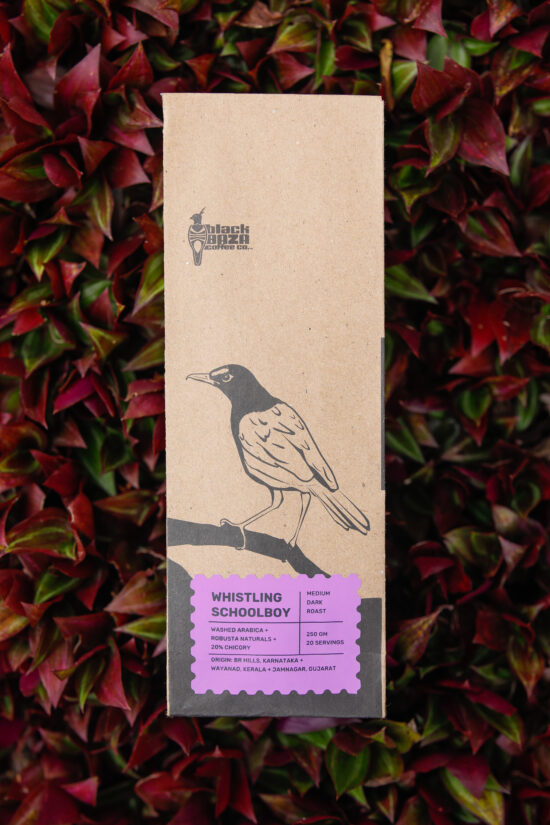

Arshiya works with the artist and graphic designer Kalabati Majumdar to visualize her message. A former textile designer, Kalabati’s old-school method splashes across each package wonderfully in a single color: black. “I sketch in pencil, then scan, then digitize. Working with Black Baza is really special to me as I am completely aligned with their vision to bring more attention to the ecosystem around coffee. In fact,” says Kalabati, “I fondly call all the species I sketch ‘the fellows.’”
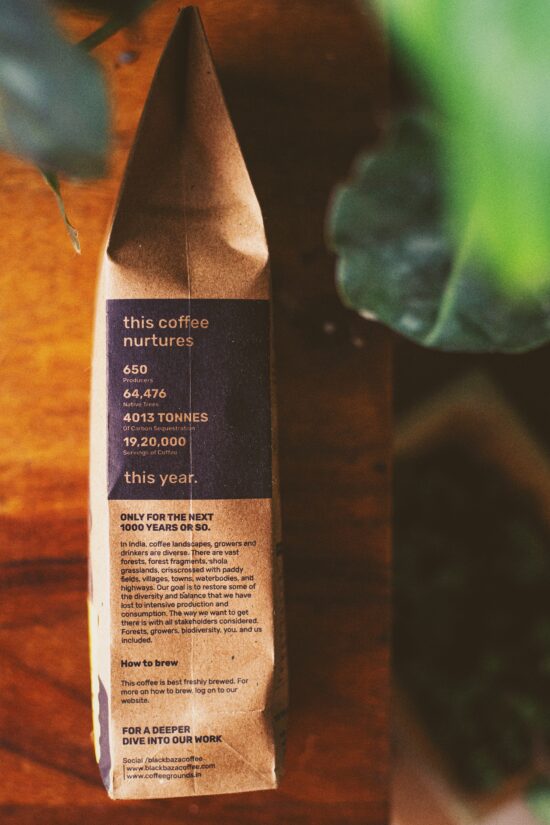

Black Baza does not have its own café yet but operates out of its roastery in Bengaluru. From there, they send their coffee out to cafés, retail stores, and individual consumers across the country.
ABOUT THE AUTHOR
Reshil Charles (he/him) is based in New Delhi, India, and works across television, web, and print as a journalist and presenter. He has been tracking emerging Indian trends across a few sectors for the last 19 years, with a special eye on the evolving Indian coffee scene. He feels strongly about exposing the world to the variety of culture and subculture in India that meets at the crossroads of traditional and modern, and coffee fits right in.
The post When Activism and Arabica Come Together: The Black Baza Coffee Company appeared first on Barista Magazine Online.



